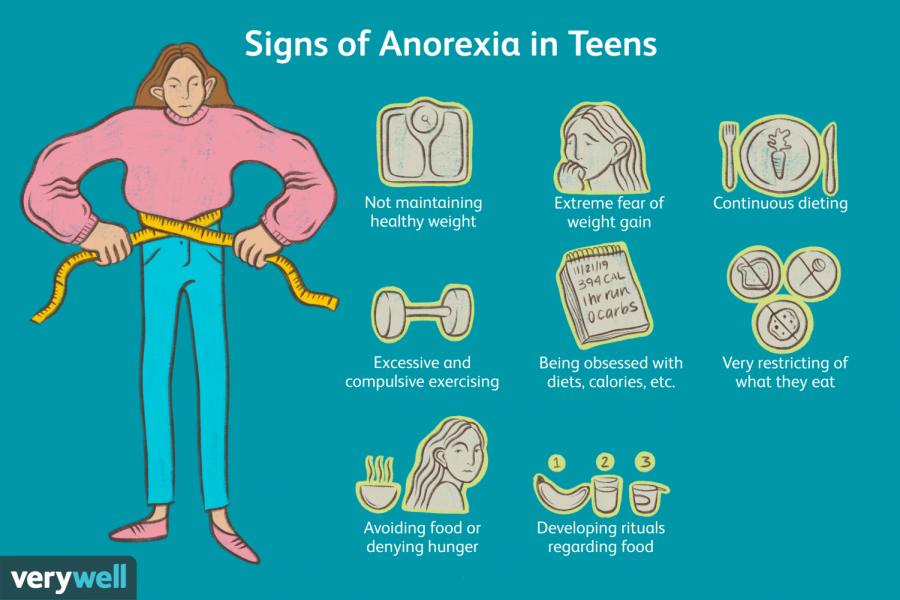Eating disorders in teens
Many people often want to achieve an ideal body, but how can these ideal standards cause health issues? Eating disorders are very common in young women but they can also happen in young men. While there is no real cause for eating disorders, they may occur when a young teen has low self esteem, poor nutrition, and stress. Bullying may also be a cause of eating disorders causing more insecurities and stress. At a young age it is typically found that a young woman believes she is too overweight or tries to lose weight drastically in order to have an ideal body. These ideal body standards may come from the internet or from other girls.
There are different types of eating disorders such as bulimia nervosa and anorexia nervosa. If someone is suffering from anorexia nervosa they will believe they are fat or overweight no matter how much weight they lose. Anorexia is a serious disorder since the patient starves themselves until they get too thin, leading to body damage and maybe even death or suicide. In anorexia cases the body will not get the nutritional value and food it needs, leading to serious damage and the patient will feel sick as they continue to starve themselves.
Bulimia is a binge eating disorder followed by vomiting, exercise or laxatives. Someone who suffers from bulimia will eat lots of high calorie food as stress eating then will often feel guilty or unsatisfied after and vomit up all the food, use laxatives or exercise till they overwork themselves. People with bulimia often vomit, which can be dangerous leading to organ failure, dehydration and causes lack of nutrition and important materials the body needs.
Aside from anorexia and bulimia there is also Avoidant/Restrictive Food Intake disorder, or ARFID, and binge eating. ARFID is when someone is an extreme picky eater and refuses to eat certain foods. ARFID can happen in younger children as also in teens, in many cases there will be significant energy and nutrition deficiency and not being able to gain weight. Binge eating is when someone eats too much but does not vomit it out like in bulimia. This binge eating can lead to being overweight and too much carbs. There are serious cases of binge eating that could lead to things like heart disease, obesity, and chronic disease.
Some symptoms of eating disorders may be refusing to eat, being insecure, spending too long in restrooms, and overeating. If a teen suffers from an eating disorder their pediatrician or psychiatrist will provide help and treatment. The person suffering from an eating disorder may also need help accepting themselves are their body. It is important to recognize the person suffering from an eating disorder before they cause permanent damage to the body.
Sources
https://www.webmd.com/mental-health/eating-disorders/understanding-eating-disorders-teens










Kate Gomez • Dec 8, 2021 at 11:02 am
Thank you for talking about this, you did a good job of explaining it.
David Guzman • Dec 8, 2021 at 10:54 am
Really well done, shows details and importance of this very serious topic
Gaby • Dec 8, 2021 at 10:40 am
This article did a good job on explaining well what eating disorders are and a few of the different disorders. It spreads a lot of important information and also states a few of the symptoms you can receive if you have eating disorders.
arely • Dec 8, 2021 at 9:05 am
This article did a good job at spreading awareness on a really important topic teens might suffer with.
Gemly Garcia • Dec 8, 2021 at 8:59 am
It was really interesting learning how there are many different reasons why people may develop an eating disorder. Along with the different TYPES of disorders.
Ashley Ramirez Marin • Dec 8, 2021 at 8:59 am
I learned much more then I thought I knew about eating disorders. Very informative. 🙂
william • Dec 8, 2021 at 8:55 am
I like how this shows attention to ED’s
Natalia Rivera • Dec 7, 2021 at 2:37 pm
What I learned from this article is how young teen’s self image is and has a great effect and can be a cause of an eating disorder; depending if teens want to go to reach that “ideal” body image.
Alison Oscal • Dec 7, 2021 at 2:35 pm
Something that I learned about this article that I didn’t know before was the different symptoms that come with Eating disorders.
Jose Rocha • Dec 7, 2021 at 2:34 pm
It was quite interesting to learn and find out about Bulimia, since I never heard of it but overall great page and also great job on bringing awareness to eating disorders.
Priscilla • Dec 7, 2021 at 2:34 pm
What this article does well is how clearly they stated the eating disorders, and how it can be caused.
Andie • Dec 7, 2021 at 2:33 pm
i like the way you add detail.
Brailyn Mendoza • Dec 7, 2021 at 2:31 pm
What I learned from this article that I did not know was that there are different types of eating disorders.
Kimberly Alvarenga • Oct 5, 2021 at 8:25 am
How did you come up with it and how long did it take to do this page i love this page
Keily • Jun 8, 2021 at 3:19 pm
You really captured the details well and I like the picture it gives a lot of information.
Keily • Jun 8, 2021 at 3:15 pm
I love the details and how true this writing is.